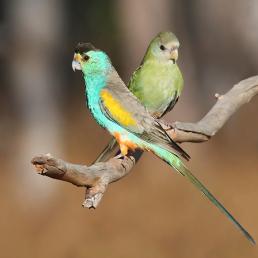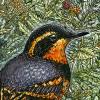

Join BirdNote tomorrow, November 30th!
Illustrator David Sibley and actor H. Jon Benjamin will face off in the bird illustration battle of the century during BirdNote's Year-end Celebration and Auction!
For birds and other animals with good natural insulation, winter provides a striking benefit as they scavenge. Bacteria function very slowly or not at all in the cold, preventing dead bodies from rotting. In northern latitudes, ravens and other scavenging birds take advantage of winter's cold storage. When a caribou, moose, or deer dies in Canada, Alaska, or other cold place in the winter, it's available to be eaten for months. Bacteria must wait until spring warms the carcass before they can begin to consume it.
Listen to this episode in Spanish here.
BirdNote®
Winter - Nature’s Cold Storage
Written by Gordon Orians
This is BirdNote.
[Call of ravens + the sound of winter wind throughout]
For birds and other animals with good natural insulation, winter provides a striking benefit as they scavenge. Bacteria function very slowly or not at all in the cold, preventing dead bodies from rotting in sub-freezing temperatures.
By way of contrast, in tropical Africa when an animal dies, bacteria quickly attack the body and convert it to a smelly, toxic mess unsuitable as food for most organisms. Vultures patrol the savanna skies, using their excellent sense of smell to find carcasses before bacteria render them inedible.
But in northern latitudes, [Winter winds] ravens and other scavenging birds and animals take advantage of winter’s cold storage. When a caribou, moose, or deer dies in Canada, Alaska, or other cold place in the winter, it’s available to be eaten for months and months. Bacteria must wait until spring warms the carcass before they can begin to consume it. [Calls of ravens]
That’s why ravens can survive during the winter in the far north. That’s why wolverines are in much better shape in the winter than they are in summer. Ravens, magpies, wolverines, wolves and foxes can rely on carcasses during the winter, because the microorganisms are suppressed by the cold. [Howl of Gray Wolves]
For BirdNote, I’m Michael Stein.
###
Sounds provided by The Macaulay Library of Natural Sounds at the Cornell Lab of Ornithology, Ithaca, New York. Call of the Raven recorded by G. Vyn; Howls of Gray Wolves recorded by W.W.H. Gunn.
BirdNote’s theme music was composed and played by Nancy Rumbel and John Kessler.
Producer: John Kessler
Executive Producer: Chris Peterson
© 2015 Tune In to Nature.org December 2013/2017/2018/2020/2023 Narrator: Michael Stein
ID# winter-01-2020-12-19





